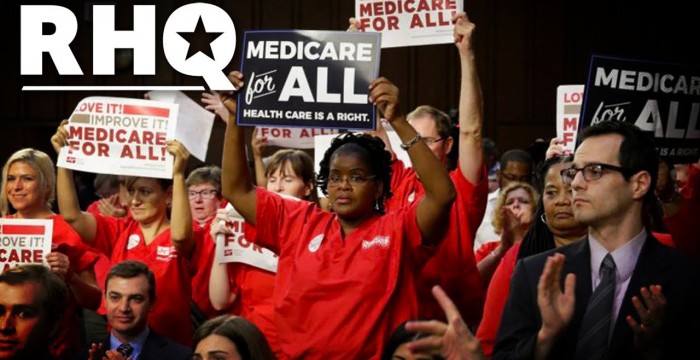Become a TYT member at:
TYT Contributor Ryan Grim ( ) reports from the Capital on the Medicare for All Bill proposed by Rep. Pramila Jayapal, D-Wash.
***
Subscribe to Rebel HQ on YouTube: …
Like Rebel HQ on Facebook:
Follow Rebel HQ on Twitter:
How Will We Pay For Medicare For All?







1:37 Sanity check: Joe Neguse in Dem-heavy Boulder-area CD2 a safe blue district – not a swing district!
As usual, a good take on the subject. Well done.
Insurance carriers for care in the United States take 90% of the money to spend for personal enrichment and 10% for patients
United States have been scammed by insurance for medical health forever they take all the money
Side effects of United States medical health coverage from insurance carriers is death. We need to eliminate all medical insurance carriers in the United States. What are we waiting for
What are you basing your 90% vs 10% on?
What about the 1.8 million people work for health insurance companies and in medical administration that would lose their jobs? What happens to the economy when you dissolve millions of jobs and remove multibillion dollar companies from the stock market in less than 2 years? There’s a reason peaple are concerned.
Protocol in United States for medical care is broken with more than 90% of doctors in United States are prejudiced with malice
when giving medical treatment to anybody United States is the worst ever to have financial means but refused to help sick and dying United States citizens and extreme medical need. They just turned her head and get amnesia
Don’t forget the doctors in United States can change your medical records at any time for the insurance carriers benefit never for the patient the patient is the enemy of the insurance carrier the patient is to be farmed out like an animal.
This may true but putting the power in the hands of one unelected secretary of health opens up a lot of potential for big pharmaceutical companies to influence that person to require new vaccines or preventative tests. Since when has the federal government been good at managing money?
I’m amazed that there is even a debate about it. It SAVES money. Better health care for LESS money. Who could be stupid enough to oppose that?
+Kenny Lee Jian Siong
*Taxes go up, but you don’t pay thousands a month for insurance, you f$%&ing moron…*
+Field Flower this is careful consideration of how to get everyone healthcare.
+Ardessa LD Well, has there been consideration about other ways that may be less disruptive? Something needs to be done, but there needs to be careful thought about what and how to do it.
I haven’t heard one politician discuss the 1.8 million people who would lose jobs in medical administration (billing) and health insurance.
I haven’t heard them discuss what the effect on the stock market when 100s of billions of stock in insurance companies becomes worthless.
I haven’t heard discussions about how Medicare is currently taking in less than it’s spending although people are paying premiums and it doesn’t fully cover everything.
When millions of jobs are lost that means even less money coming into social security to pay for Medicare.
The wealth tax doesn’t make up anywhere close to the amount needed to close the gap between what would be needed and what is coming in when you add more services and more people. So I’m not hearing a real transparent discussion about the actual numbers.
Only comparing spending without comparing what’s coming into the fund doesn’t give a full picture of what’s needed and how to achieve it.
I’m not hearing about the power being taken even farther away from local people and making the federal government more powerful when there may be options that would make local government medical coops or something, so people would have more oversight of the process and be more involved in decision making.
That’s the kind of things I mean. Other ideas. There’s surely more ideas than either huge insurance companies or a huge federal government controlling it. (they always deficit spend.)
Careful consideration of the consequences of making an industry creating millions of jobs irrelevant and 100s of billions of dollars in stock worthless.
Some thing like this needs to be dismantled with care about the potential catastrophic effects. A thoughtful strategy that looks at the national debt, the social security fund, US bonds (that are IOUs for the government to repay the money it borrowed from Social Security which funds Medicare. Since it’s 21Trillion in debt that isn’t likely), the stock market, the job market is necessary…
I’m not hearing that careful consideration of any of this is happening or if it is let’s hear about it. ☺
+Field Flower it won’t happen overnight. There are many videos and articles on it. There are countries who have successfully done it and love their healthcare. With everyone getting healthcare there will be a greater need for workers for this care. Workers of all kinds. People die without proper healthcare. Someone who loses a job gets another, possibly a better one. Insurance work isn’t a great job.
+Ardessa LD Did you hear her time table? 2 years total. And she hasn’t had a study to determine the cost of her bill.
Just saying other countries have done it successfully doesn’t mean anything with something with this many macroeconomics implications . You can’t just figure out as you go.
Was that government 21 trillion dollars in debt when it transitioned? ☺ The US has the biggest debt in the world.
Did other countries have 100s of billions of stocks in insurance at the time trading on a global stock market?
Just because insurance jobs aren’t that good that doesn’t mean people want to lose their jobs. But even if you don’t consider them, when a big company employing 56,000 employees, like Anthem, closes its doors people working in shops, cafes, spas, salons, delivery services, lose their jobs or get their hours cut as well. People working in repair, tech, uber, cleaning, lawn care and landscaping services lose jobs.
Also, there may be other ways to fix the problem that should be considered if there’s going to be a disruption why not try something different that keeps the power closer to the people?
Actually, Joe Neguse is not in a swing district.
How can we justify *NOT* having it?
you can’t
Do you realize the Sander’s Institute is proposing a payroll tax and a 3.75% federal sales tax to fund more if it than the wealth tax does? There are reasons for discussion on the best way to fix the problem.
https://www.sandersinstitute.com/blog/medicare-for-all_-i-like-it-how-do-we-pay-for-it
It costs more to not have it. Why is there even an argument against it then.
In economics It’s called externalities.
The cost to you, is an externality to the capitalist, thus it is of no importance to him.
To the capitalist, since whatever he “pays” you he takes anyway out of what you produced — he would rather pay a little more to a medical insurance company, but have a workforce made of obedient, frightened workers, willing to accept any abuse.
Exactly! THis is what everyone fails to realise. How are we currently paying for the system we have. WITH DEAD AMERICANS.
Because there may be more than one way to fix it…Do you realize that the Sander’s Institute poropsed more of the funding come from a 3.75% federal sales tax than from wealth taxes?
https://www.sandersinstitute.com/blog/medicare-for-all_-i-like-it-how-do-we-pay-for-it
Because for profit insurance pays people to oppose it.
Thank you Pramila Jayapal for not selling us out. I was super worried when I heard she was making changes to the M4A bill. I was worried they were going to water it down. But nope. She made it stronger. Thank you Jayapal!
Me too. I cant wait for THR to cover it. Then i can be 100%
Yeah I was pissed when she killed John Conyers’ bill but then she goes around and does this which restores my faith back in her.
shes sounds like a frauid i support bernie !
Trust the nurses on this one
I’m excited and proud of progressives for what we’ve achieved since 2016, and I totally support medicare for all, but I also don’t mind having a little bit of a co-pay, and I don’t make a lot of money, but I can also appreciate the idea that I’m directly contributing towards the funding of my own medical bills. Call it empowerment maybe, and maybe some other folks feel the same way. But I hope we can continue talking about the specifics of the bill, and encourage the discussion about funding it, and phasing it in, etc, and make it that much more real and feasible in people’s minds. ✌️
Private insurance companies: all the money you paid over years counts toward absolutely NOTHING once you lose the coverage. It’s even less than throwing money on rent (in which you at least get a shelter, as long as you pay. In one word: LIABILITY.
Single payer: all the money you pay throughout life counts toward building the medical system of your country, regardless of your employment status. In one word: INVESTMENT.
In the US, people often lose their coverage exactly when they need it, since when they get sick, they cannot keep going to work, they are fired, and lose their insurance plan…. the business model is a scam.
Hope you can tell the difference.
+Tom Joad this throwing money away on rent talking point has been debunked too many times now fam.
The rest of your comment is on point tho
In a Medicare for All system, you’d be directly contributing to healthcare by paying taxes towards it. If it’s going to cover everyone regardless of their ability to pay, it has to be free at the point of service.
Ryan Grim doing what he does best – get in the thick of the action and reporting on the issues! Great job!
no need to reinvent the wheel , all european countries have health care , if you wanted to make cookies following an established recipe might be a good idea
From those of us in the civilised world who already benefit from this type of system, we hope the United States will someday soon adopt something similar.
GREAT JOB RYAN! I know i completely understand now
I’m looking forward to saying to my US friends… “Welcome to the 20th century.”
That’s my Rep. Proud progresssive from Washington State!
what’s more expensive than single payer?
doing nothing or keeping the same system we have.
f’n simple.